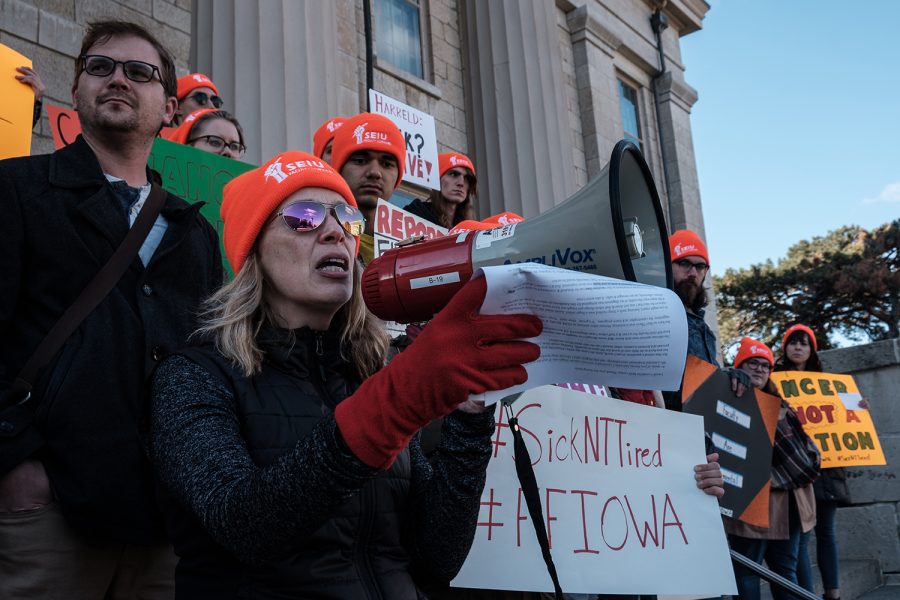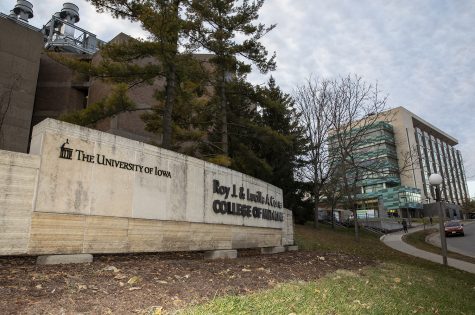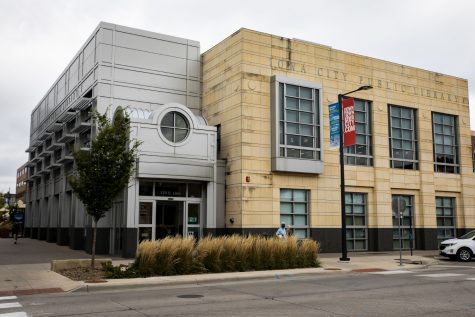Guest Opinion: Faculty Senate has power to fix catastrophic leave
The problems with the sick-leave policy at the UI have solutions. They just need to be put into action.
Associate Professor of Instruction for the Rhetoric Department Megan Knight reads a statement during a protest for sick leave time at the Old Capitol Building on Tuesday, October 29, 2019. Faculty Forward would like to establish a sick leave bank for non-tenure track faculty. The University of Iowa’s Catastrophic Leave policy covers two percent of faculty members in the College of Liberal Arts and Sciences, most of the uncovered faculty are non-tenure track.
February 20, 2020
Last semester, months of meetings and back-and-forth between some of my contingent faculty colleagues, members of Faculty Senate, and representatives of the University of Iowa Human Resources department came to a sudden halt when the faculty senators decided to push through a catastrophic sick-leave policy that would be nothing more than a simple fix to a disadvantageous problem.
Faculty Senate unanimously voted to push through an expansion to the UI’s current catastrophic sick-leave policy to nonvacation-accruing faculty on Sept. 17, 2019.
At face value, this may seem like an impressive step to make the policy more inclusive, but it presents a number of challenges.
If you’ve kept up to date with any of the university happenings over the past year, then you might remember the April 2019 state Board of Regents meeting where members of UI contingent faculty held the floor demanding a meeting with the Regents to discuss a catastrophic sick-leave policy for UI faculty.
That meeting (finally) happened, and so did subsequent meetings with UI faculty senators and representatives from HR.
For those of you who may not know, the UI doesn’t have short-term disability coverage. That means if any person employed by the UI were to become catastrophically ill, they would have to use sick time (or vacation time for those eligible) to fill the 90-working-day gap before long-term disability took effect. As the “new” policy currently stands, eligible faculty and staff — those with appointments of 50 percent or greater and accrue vacation or sick time — can donate unused vacation time to other eligible employees. This means that faculty members who do not accrue vacation time must seek the assistance of staff that do.
This doesn’t solve the problem. Let’s be clear — there is another option.
There is a policy that was drafted in committee by my colleagues over the summer with input and support from both faculty senators and Human Resources representatives that would have benefited all faculty at the university. The proposed policy would have created a “Catastrophic Sick Leave Bank” that would have a minimum of 800 days per year from the university and would be accessible to any faculty member in the College of Liberal Arts and Sciences after they exhausted their individual sick leave. In addition, it would also allow faculty to contribute their own unused sick time to the bank, should the need arise, essentially allowing faculty to donate unused sick leave to one another.
So, while you think it’s great that Faculty Senate voted to expand the existing policy to nonvacation-accruing faculty, they have done nothing to increase the supply for this newly increased demand.
While Faculty Senate markets itself as “shared governance,” many of us at the UI, especially those of us who are nontenure-track faculty, do not feel that it is acting in our best interest.
After months of meetings in committee to draft a suitable policy, something else was brought to a vote. In committee, my two colleagues voted against the policy while all of the other members abstained.
If that’s what happened in committee, then why was this brought to the floor? Why was a policy that was voted down in a committee so quickly, and unanimously, pass by Faculty Senate?
If they were able to pass this cataclysmic policy so quickly without consideration, then why can’t they pass something that would actually solve the problem at hand?
That’s my challenge.
I’m challenging Faculty Senate to continue its work immediately and draft, vote on, and pass a policy that is effective and beneficial for all faculty.
— Dakota Thomas-Wilhelm, UI English as a second language lecturer













